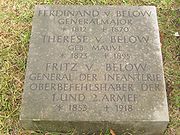
Fritz von Below
Encyclopedia
Fritz Wilhelm Theodor Karl von Below (born 23 September 1853 in Danzig (Gdańsk
); died 23 November 1918 in Weimar
) was a Prussian
general
in the German Army
during the First World War
.
after Paul von Hindenburg
from 1914 to 1916, the Second Army at the beginning of the Somme offensive
in 1916, and finally the First Army which was involved in fighting in November 1916.
He was awarded the Pour le Mérite
medal on 16 February 1915. Below died in Weimar shortly after Germany had signed the armistice
.

Gdansk
Gdańsk is a Polish city on the Baltic coast, at the centre of the country's fourth-largest metropolitan area.The city lies on the southern edge of Gdańsk Bay , in a conurbation with the city of Gdynia, spa town of Sopot, and suburban communities, which together form a metropolitan area called the...
); died 23 November 1918 in Weimar
Weimar
Weimar is a city in Germany famous for its cultural heritage. It is located in the federal state of Thuringia , north of the Thüringer Wald, east of Erfurt, and southwest of Halle and Leipzig. Its current population is approximately 65,000. The oldest record of the city dates from the year 899...
) was a Prussian
Kingdom of Prussia
The Kingdom of Prussia was a German kingdom from 1701 to 1918. Until the defeat of Germany in World War I, it comprised almost two-thirds of the area of the German Empire...
general
General
A general officer is an officer of high military rank, usually in the army, and in some nations, the air force. The term is widely used by many nations of the world, and when a country uses a different term, there is an equivalent title given....
in the German Army
German Army (German Empire)
The German Army was the name given the combined land forces of the German Empire, also known as the National Army , Imperial Army or Imperial German Army. The term "Deutsches Heer" is also used for the modern German Army, the land component of the German Bundeswehr...
during the First World War
World War I
World War I , which was predominantly called the World War or the Great War from its occurrence until 1939, and the First World War or World War I thereafter, was a major war centred in Europe that began on 28 July 1914 and lasted until 11 November 1918...
.
Biography
In 1912, Below was appointed to the command of the 21st Army Corps. In this capacity, he fought along with the Sixth Army on the western front at the beginning of World War I, but his corps was transferred in 1915 to the eastern front. He then commanded the Eighth Army8th Army (Imperial Germany)
The 8th Army was an army level command during World War I.At the outbreak of World War I, the 8. Armee was stationed in East Prussia to defend against the expected Russian attack, Plan XIX. After the scrappy Battle of Gumbinnen, 8. Armee commander Generaloberst Maximilian von Prittwitz ordered a...
after Paul von Hindenburg
Paul von Hindenburg
Paul Ludwig Hans Anton von Beneckendorff und von Hindenburg , known universally as Paul von Hindenburg was a Prussian-German field marshal, statesman, and politician, and served as the second President of Germany from 1925 to 1934....
from 1914 to 1916, the Second Army at the beginning of the Somme offensive
Battle of the Somme (1916)
The Battle of the Somme , also known as the Somme Offensive, took place during the First World War between 1 July and 14 November 1916 in the Somme department of France, on both banks of the river of the same name...
in 1916, and finally the First Army which was involved in fighting in November 1916.
He was awarded the Pour le Mérite
Pour le Mérite
The Pour le Mérite, known informally as the Blue Max , was the Kingdom of Prussia's highest military order for German soldiers until the end of World War I....
medal on 16 February 1915. Below died in Weimar shortly after Germany had signed the armistice
Armistice with Germany (Compiègne)
The armistice between the Allies and Germany was an agreement that ended the fighting in the First World War. It was signed in a railway carriage in Compiègne Forest on 11 November 1918 and marked a victory for the Allies and a complete defeat for Germany, although not technically a surrender...
.


